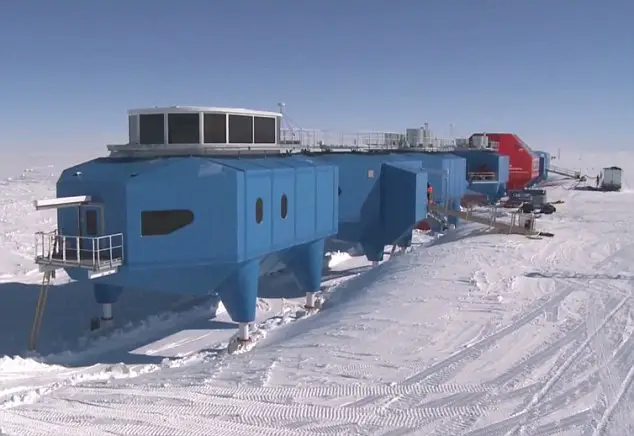One of the big stories that broke while I was away at Outdoor Retailer was the complete power loss at the Halley Research Station in Antarctica. The remote base suffered a failure of its generators back on July 30, although the story wasn’t revealed until last week.
The loss of power shutdown all electricity and heat, leaving the base in dire straits in the middle of winter. The skeleton crew of 13 researchers that live there during the offseason were then forced to scramble to find alternate ways to stay warm, while repairs to the generator could be conducted. The blackout couldn’t have come at a worse time however, as temperatures plunged to a record low of -55ºC/-67ºF.
In order to focus on the task at hand, which included finding ways to restore power, and stay warm in the isolated base, all experiments at the station were shut down, and the crew was forced to evacuate to parts of the station that had been shuttered for the winter months.
Since then, they have been sleeping on the floor of a garage, while they look for ways to get the Halley back up to full capacity. So far, they haven’t had much luck in that department, although they have managed restore partial power and heat.
As if the struggle to stay warm wasn’t enough of a challenge, storms have been frequent throughout the area surrounding the base in recent days, which has helped to keep temperatures, and the spirits of the crew, low. The sun did finally poke its way through the cloud cover however, and while it doesn’t have much of a warming effect this time of year, it has at least helped to cheer the men and women stationed at the base.
It is unclear at this point whether or not full power can be restored without more staff and equipment. Considering how dangerous the winters in Antarctica are, that means that help may not arrive until October or November of this year.
It doesn’t seem that the Halley team is in any danger at the moment, although they aren’t exactly comfortable either. The base, which has monitored atmosphere conditions above Antarctica since the 1950’s, is only conducting the most basic of research at the moment, as all reserve power goes to keeping the crew as warm as possible.
The failure of the electrical system stemmed from a large coolant leak in the station’s main heating system. That in turn led to the power generators overheating, which led to a complete failure of the system.
The team has managed to keep things operating by not putting too much stress on the generators, even at the expense of their own comfort. We are assured that the crew is safe however, and that all efforts are being made to ensure that they stay that way.
Resupply operations aren’t scheduled to take place until the start of the austral summer. Hopefully there won’t be any further issues until then, at the Halley Research Station crew can maintain the base until help can arrive in a few months.
- Gear Review: The Xero Scrambler Mid is an Ultralight Hiking Shoe for Spring - March 1, 2023
- Gear Review: Yeti Roadie 48 Wheeled Cooler - August 18, 2022
- Kristin Harila Continues Pursuit of 8000-Meter Speed Record - August 16, 2022
